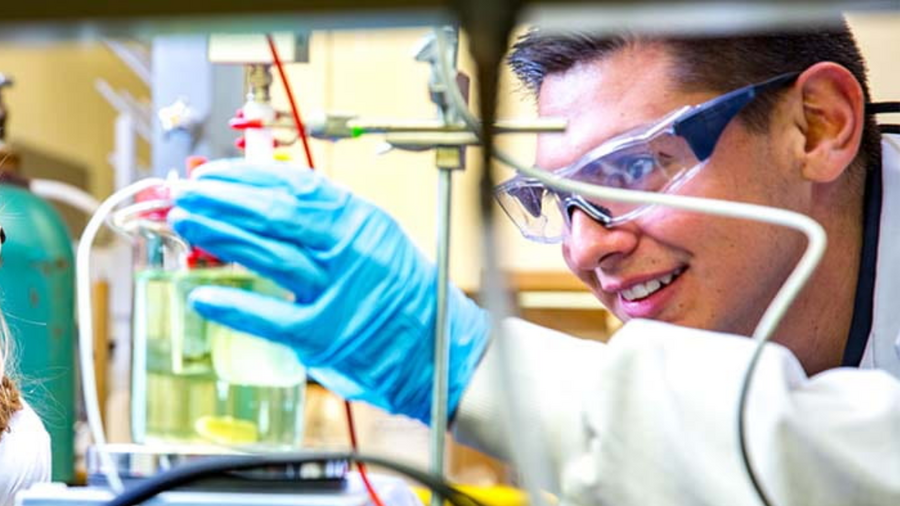University of Arkansas
Ralph E. Martin Department of Chemical Engineering
3202 Bell Engineering Center
Fayetteville, AR 72701-1201
Phone: (479) 575-4951
Fax: (479) 575-7926
Graduate Program

The graduate program in our department offers the Master of Science in Chemical Engineering (M.S.Ch.E.) and Doctor of Philosophy (Ph.D.) with a concentration in Chemical Engineering. The most commonly-asked questions about the program are addressed below. You can download the department’s Graduate Student Handbook which is a complete guide to applying to the program, the coursework requirements, and details funding.
Outcomes and Objective
The program goal, or educational objective, of the Chemical Engineering graduate program is to prepare students for advanced roles in the profession through a combination of planned coursework and research activities so that graduates are equipped to address present and future challenges in such areas as research, teaching, management, and commercialization.
The educational outcomes of our graduate program are to assure that each student has had an opportunity to:
- Critically analyze meaningful and technologically relevant data, and for thesis students, plan and safely conduct research;
- Demonstrate proficiency in fundamental mathematics and chemical engineering problem solving;
- Understand professional and ethical responsibility; and
- Develop and use effective written and oral communication skills.
What are the entrance requirements?
- A grade point average of 3.0 out of 4.0 in a completed B.S. or M.S. in chemical engineering.
- The Ralph E. Martin Department of Chemical Engineering is waiving Graduate Record Examination (GRE) scores for all upcoming academic terms.
- Students will also be required to submit a Statement of Purpose (two-page maximum), a CV/Resume, and three letters of recommendation.
- Applicants need to meet the university's English language requirements for admission, as stated by the Graduate School and International Education.
- The Department offers Master's and PhD degrees for students who do not have a BS in chemical engineering but have a Bachelor’s degree in another subject. For more information on this application process, please read the "Getting Into the Program Without a Chemical Engineering Degree" section of the Graduate Student Handbook.
What kind of funding is available?
Due to the years of additional study past the Bachelor's degree, the broader duties of the graduate student, and the desire to attract the best students, the Department offers financial assistance for incoming graduate students. No additional application is required to receive funding. Strong preference for funding will go to students seeking the Ph.D. degree.
If you receive funding, it will pay all tuition, some student fees, and provide a living stipend at one the following levels:
Master’s students: $18,000 per year
PhD students: $26,600 per year before the candidacy exam; $29,000 after successful
completion of the candidacy exam
Graduate Research Fellowships
The University of Arkansas' Graduate School offers two levels of competitive merit-based fellowships to provide financial support to outstanding doctoral students. This support is in addition to the Department's base stipend.
Doctoral Academy Fellowships - $12,000 per year
GPA: 3.50/4.00 if entering with a BS in chemical engineering, natural science, or
other engineering program. 3.65/4.00 if entering with a MS in a similar subject area.
GRE: verbal plus quantitative score of at least 307, with a GRE writing score of 4.5
or higher
Distinguished Doctoral Fellowships - $22,000 per year
GPA: 3.65/4.00 if entering with a BS in chemical engineering, natural science, or
other engineering program. 3.85/4.00 if entering with a MS in a similar subject area.
GRE: verbal plus quantitative score of at least 314 with a GRE writing score of 5.0
or higher
Additional Fellowship Options
In addition to the doctoral fellowships, the university offers fellowship opportunities
such as the Benjamin Franklin Lever Tuition Fellowship and the James H. White Doctoral Fellowship. External funding sources can be reviewed
here.
The Office of Nationally Competitive Awards also maintains a fellowship and scholarship directory.
What degree programs are offered?
Three graduate degree programs are offered by the department, a Master of Science with a thesis, a Master of Science without a thesis, and a Doctor of Philosophy.
The M.S.Ch.E. consists of 24 hours of coursework (8 courses), a research project supervised by a faculty member, and the defense of a written thesis. Thesis work consists of 6 hours of coursework. Funding is available for thesis master's students.
The non-thesis M.S.Ch.E. is not offered as a terminal degree. It consists of at least 30 hours of coursework and assisting in departmental teaching is required. Funding is not available for non-thesis master's students.
The PhD degree consists of 48 hours of coursework, a research project supervised by a faculty member, and the defense of a written dissertation. In addition, students must pass a set of qualifying exams. Funding is available for doctoral students.
What research areas are available?
- Chemical Process Safety
- Advanced Separations and Membranes
- Cellular Engineering
- Energy
- Material Science and Engineering
- Data Science/ Computational Chemical Engineering
- Nanotechnology
- Water
How do I find out more?
You can download the department’s Graduate Student Handbook, which is a complete guide to applying to the program, the coursework requirements, and details on funding.
For questions not addressed in the handbook, contact the chemical engineering Graduate Program Coordinator